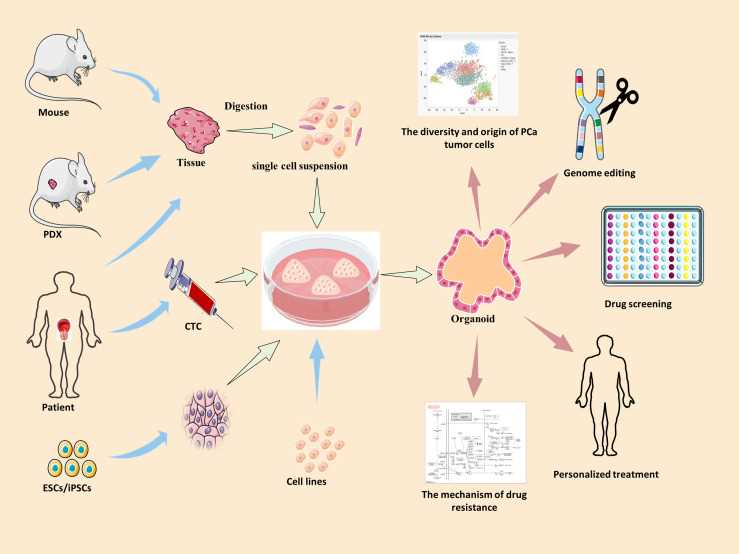All products and services are For Research Use Only and CANNOT be used in the treatment or diagnosis of disease.
Prostate cancer (PCa) is one of the most malignant tumors among men, which presents a high heterogeneity and incidence rate around the world. Relapse and resistance often occur after current treatment and progress to neuroendocrine carcinoma or metastasis to other organs. There is an urgent need to increase the knowledge of pathogenesis and complex heterogeneity to enhance the development of promising drugs and therapies for patients. Cancer organoid is a powerful 3d culture that recapitulates the key features of clinical tumor tissue and allows genetic manipulation to study the mechanism of origin. Moreover, the organoid is a proper model for in vitro large-scale screening and tests.
 Fig.1 Establish prostate cancer organoids from different pathways for various applications. (Zhou, et al., 2021)
Fig.1 Establish prostate cancer organoids from different pathways for various applications. (Zhou, et al., 2021)


|
| Necessary Compounds and Growth Factors | |||
| Epidermal growth factor (EGF) | Dihydrotestosterone (DHT) | R-spondin-1 | Anaplastic lymphoma kinase (ALK) inhibitor |
| Fibroblast growth factor-2 (FGF2) | Prostaglandin E2 (PGE2) | Nicotinamide | Fibroblast growth factor-10 (FGF10) |
| Rho kinase inhibitor | Noggin | B27 supplement | N-acetylcysteine |
| P38 inhibitor | |||
Cancer organoids can be generated from multiple phenotypes of prostate cancers using different sources of tumor cells.
| Diverse Clinical Reported Gene Mutations in Prostate Cancer | ||||
| TMPRSS2-ERG | ETS | SPOP | SPINK1 | FOXA1 |
| PIK3R1 | CHD1 | PTEN | Androgen receptor | |
| Description | Technique | |
| Phenotype Characterization |
|
|
|
Molecular Characterization |
|
|
Creative Biolabs is a leader in CAR-T therapy development. We have extensive CAR-cell therapy-related products and offer customized CAR-T development services for various tumors to clients worldwide.
| Target Antigen | Target Description | CAR-T Products |
| PSCA | PSCA is a prostate cancer-related protein that expresses on the surface of basal and secretory epithelial cells. The protein is also associated with gastric, renal, and pancreatic cancer. | Anti-PSCA CAR-T |
| EpCAM | Epithelial cell adhesion molecule (EpCAM) mediates cell-cell adhesion in epithelia and is relevant to cell growth and metastasis. EpCAM is a potential target for immunotherapy of various solid tumors. | Anti-EpCAM CAR-T |
| PSMA | Prostate-specific membrane antigen (PSMA) is mainly expressed on prostate cancer cells and serves as a diagnostic biomarker and targeted protein for clinical treatment. | Anti-PSMA CAR-T |
| PSA | Prostate-specific antigen (PSA) is widely present in normal and cancer cells of prostate tissues, but the concentration is increased in patients' blood with prostate cancer. | Anti-PSA CAR-T |
| PAP | Prostatic acid phosphatase (PAP) is the secretory glycoprotein from prostate epithelial cells, and the elevated concentration of PAP in human blood indicates prostate cancer and neoplastic hematologic disorder. | Anti-PAP CAR-T |
Creative Biolabs has committed to cancer organoid technology and is continually discovering to simulate the tumor features and microenvironment to more extent. If you have trouble with cancer organoids culture and application, please contact us for help.
Reference
For any technical issues or product/service related questions, please leave your information below. Our team will contact you soon.
 NEWSLETTER
NEWSLETTER
The latest newsletter to introduce the latest breaking information, our site updates, field and other scientific news, important events, and insights from industry leaders
LEARN MORE NEWSLETTER NEW SOLUTION
NEW SOLUTION
CellRapeutics™ In Vivo Cell Engineering: One-stop in vivo T/B/NK cell and macrophage engineering services covering vectors construction to function verification.
LEARN MORE SOLUTION NOVEL TECHNOLOGY
NOVEL TECHNOLOGY
Silence™ CAR-T Cell: A novel platform to enhance CAR-T cell immunotherapy by combining RNAi technology to suppress genes that may impede CAR functionality.
LEARN MORE NOVEL TECHNOLOGY NEW SOLUTION
NEW SOLUTION
Canine CAR-T Therapy Development: From early target discovery, CAR design and construction, cell culture, and transfection, to in vitro and in vivo function validation.
LEARN MORE SOLUTION